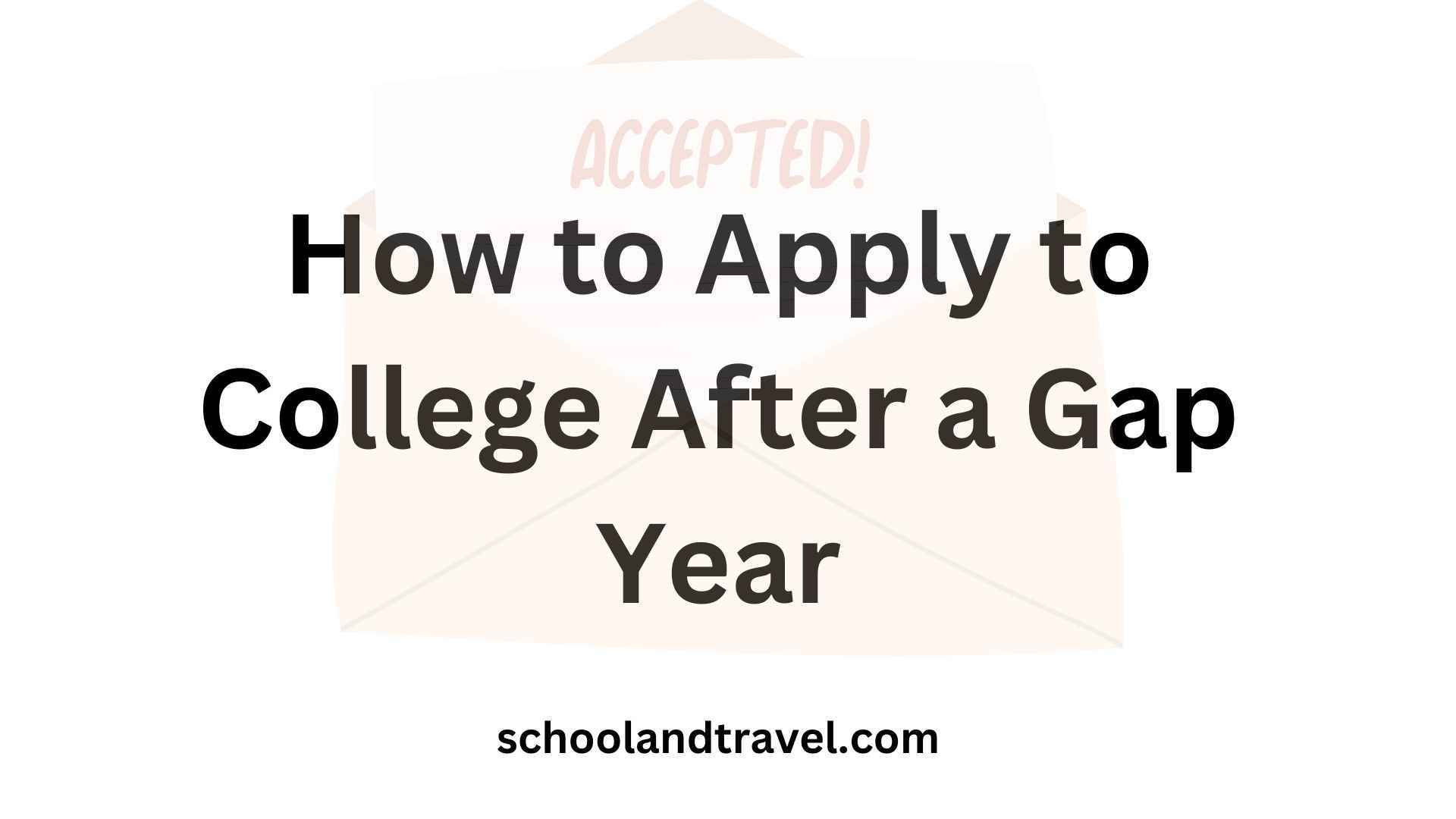Taking a gap year before college has become an increasingly popular choice for students seeking personal growth, experiential learning, or a break from the traditional academic track.
Whether you spent your gap year traveling, working, volunteering, or pursuing a passion, the time has come to transition back into higher education.
As you embark on the application process, it’s crucial to take it on with careful planning and consideration.
This article will provide a guide for you.
What is a Gap Year?
A gap year is typically taken after completing high school or before starting college or university, during which individuals take a break from formal education to engage in alternative experiences.
It is an intentional break from the traditional academic path, allowing individuals to explore other interests, gain new skills, pursue personal growth, and expand their worldview.
Tips on How to Apply to College After a Gap Year
This guide aims to provide you with valuable understanding and practical advice on how to apply to college after a gap year successfully:
1. Reflecting on Your Gap Year Experience
Before diving into the application process, take the time to reflect on your gap year experience.
Consider the skills you developed, the knowledge you gained, and the personal growth you underwent.
Reflecting on these aspects will help you articulate your experiences effectively in your application essays and interviews.
2. Evaluating College Goals and Objectives
Your perspective on education and future goals might have evolved during your gap year.
Take the opportunity to reassess your college goals and objectives.
Think about the subjects or majors that now interest you, any career paths you have discovered, and the college environment that aligns with your values and aspirations.
3. Researching Colleges and Programs
With a clearer understanding of your goals, explore colleges and programs that align with your interests.
Consider factors such as academic reputation, location, campus culture, available resources, and extracurricular opportunities.
Engage with college websites, attend virtual tours or information sessions, and connect with current students or alums to gather valuable insights.
4. Communicating with Admissions Offices
Contact the admission offices of the colleges you are considering.
Explain that you are applying after a gap year and inquire about any specific requirements or guidelines for gap year applicants.
This proactive communication demonstrates your enthusiasm and helps you stay well-informed about the application process.
5. Crafting a Compelling Application
When filling out your application, highlight the experiences and skills you acquired during your gap year.
Emphasize how these experiences have shaped your personal and academic growth.
Tailor your application essays to showcase your unique perspective, the lessons learned, and how your gap year contributed to your readiness for college.
6. Obtaining Letters of Recommendation
Seek letters of recommendation from individuals who can speak to your personal and academic growth during your gap year.
This could include employers, volunteer coordinators, mentors, or teachers who have witnessed your development firsthand.
Ensure that your recommenders can speak to your character, work ethic, and ability to thrive in an academic environment.
7. Addressing Academic Transcripts and Test Scores
Some colleges may require you to submit academic transcripts and standardized test scores.
Include those transcripts in your application if you had any academic pursuits or coursework during your gap year.
Additionally, if you previously took standardized tests like the SAT or ACT, check if your scores are still valid or consider retaking the tests if necessary.
Reasons for Taking a Gap Year From College
There are several reasons why individuals choose to take a gap year. Here are some common motivations for taking a gap year:
1. Personal Growth and Self-Discovery
Many people use a gap year as an opportunity for personal reflection and exploration.
They want to understand themselves better, their values, and their goals before committing to further education or career paths.
2. Refresh and Recharge
After completing several years of formal education, some individuals feel burnt out and need a break.
A gap year allows them to step back, rest, and rejuvenate before pursuing further studies or entering the workforce.
3. Academic Exploration
Some individuals may want to explore different academic interests or gain a broader perspective before choosing a college major.
They may use the gap year to take courses, research, or engage in experiential learning opportunities to inform their academic and career decisions better.
4. Gap Year Programs and Experiences
Various structured gap year programs offer specific experiences, such as volunteering, cultural immersion, outdoor adventures, or internships.
These programs provide unique opportunities to develop skills, gain global perspectives, and make a positive impact before transitioning to college or work.
5. Travel and Cultural Immersion
Exploring different cultures, countries, and environments is a popular reason for taking a gap year.
It allows individuals to broaden their horizons, gain intercultural competencies, and develop a global perspective.
6. Personal Development and Skill Building
Some individuals may use their gap year to develop specific skills or pursue personal interests.
They may engage in activities like learning a new language, mastering a musical instrument, improving athletic abilities, or undertaking creative projects.
Activities that can be Done During a Gap Year From College
During a gap year, there are various activities you can engage in to make the most of your time and enhance your personal growth and development.
Here are some detailed activities you can consider:
1. Travel and Cultural Immersion
Backpack through different countries or regions to experience new cultures, languages, and perspectives.
Participate in volunteer programs abroad to contribute to community development projects or conservation efforts.
Work or intern abroad to gain international work experience and expand your professional network.
Take part in language immersion programs to familiarize yourself with a new language or improve your language skills.
2. Volunteering and Service
Engage in local community service initiatives, such as tutoring, mentoring, or working with nonprofits.
Volunteer with organizations focusing on social causes like environmental sustainability, poverty alleviation, and healthcare.
Join disaster relief efforts or contribute to rebuilding projects in areas affected by natural disasters.
Assist in wildlife conservation projects, animal shelters, or environmental preservation initiatives.
3. Professional Development
Secure an internship or apprenticeship in a field of interest to gain practical work experience.
Take part-time or freelance work to develop transferable skills and gain real-world exposure.
Enroll in skill-based courses or workshops to enhance your technical abilities (e.g., coding, graphic design, photography).
Seek mentorship or shadow professionals in areas you are considering for your future career.
4. Academic Pursuits
Take college courses or enroll in online programs to explore academic subjects or specific areas of interest.
Pursue independent research projects or creative endeavors in science, arts, or humanities.
Attend workshops or conferences related to your academic interests or potential majors.
Explore online learning platforms that offer a wide range of courses and certifications.
5. Personal Growth and Reflection
Engage in personal development activities such as meditation, yoga, or mindfulness practices.
Read books, attend lectures, or join discussion groups to broaden your knowledge and perspectives.
Undertake an expressive project, such as writing a book, creating art, or learning to play a musical instrument.
Reflect on your experiences through journaling, blogging, or vlogging to deepen self-awareness and capture memories.
6. Entrepreneurial Ventures
Start your own small business or social enterprise to develop entrepreneurial skills. Launch a website or online platform to share your passion, expertise, or creative works.
Participate in startup incubators or accelerators to receive guidance and support for business ideas.
Connect with mentors or business networks to gain insights and learn from successful entrepreneurs.
7. Health and Well-being
Focus on physical fitness by participating in sports, joining a gym, or taking up outdoor activities. To improve mental well-being, engage in mindfulness practices, such as yoga, meditation, or tai chi.
Learn and adopt healthy cooking habits, explore new recipes, and experiment with nutritious food choices.
Explore alternative therapies or practices like acupuncture, herbal medicine, or Ayurveda.
Frequently Asked Questions (FAQs) on How to Apply to College After a Gap Year
A gap year can enhance your college application if you use your time effectively.
Admissions officers often value the personal growth, maturity, and unique experiences gained during a gap year.
Use your statement or additional essays to explain your gap year experiences, goals, and the skills you developed.
While not all colleges require documentation, providing evidence of your gap year activities is beneficial.
This can include certificates, awards, letters of recommendation, or a portfolio showcasing projects or achievements during your gap year.
It’s optional to contact colleges before applying.
Still, if you have specific questions or concerns about how your gap year will be evaluated, you can contact admissions offices for clarification.
Conclusion
Applying to college after a gap year is an exciting opportunity to showcase your personal growth and unique experiences.
By reflecting on your gap year, researching colleges, communicating effectively, crafting compelling application materials, and obtaining solid recommendations, you can enhance your chances of gaining admission to a college that aligns with your goals.
Awesome one; I hope this article answers your question.
Editor’s Recommendations:
- 9 Mormon Colleges And Universities in the US (FAQs)
- Doctor of Theology vs. Doctor of Ministry (Diff & Simi, FAQs)
- 5 Types of Bible Translations To Avoid (FAQs)
- 5+ Best Jobs in Mexico for English Speakers (FAQs)
- 71+ Christianity Questions That Cannot Be Answered (FAQs) (Updated)
If you find this article good, please share it with a friend.



